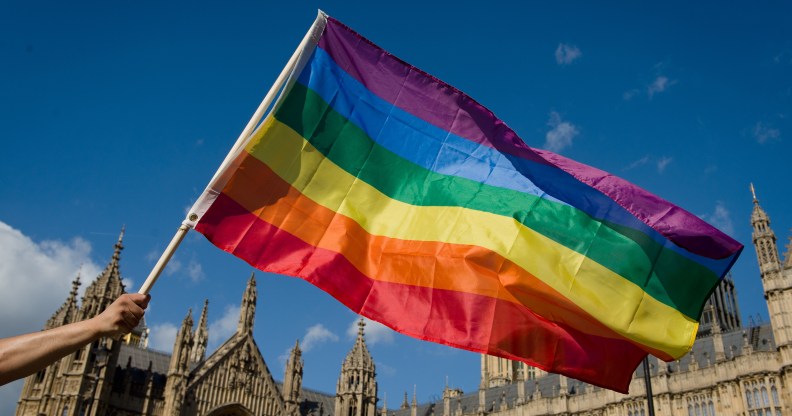Who exactly is the minister for gay rights?

A protester holds a rainbow flag outside the Houses of Parliament in central London on June 3, 2013, as protesters gather in support of same-sex marriage (LEON NEAL/AFP/Getty Images)
There is confusion as to which member of the Brown government will be taking responsibility for women and equality issues.
The appointment of Harriet Harman as Minister for Women last week seemed to indicate that she would be in charge of gay rights and other issues that fall under the remit of the Women and Equality Unit.
However, the unit is part of the Department of Communities and Local Government, headed by Hazel Blears.
In Tony Blair’s administration, junior DCLG minister Meg Munn had responsibility for equality issues.
There are questions on Women and Equality in the House of Commons tomorrow morning, yet the DCLG said today that they still cannot confirm which minister will be answering them.
Gordon Brown has appointed John Healey and Yvette Cooper as Ministers of State at DCLG and Parmjit Dhanda and Iain Wright as Parliamentary Under Secretaries of State.
It is thought that an instrument will be laid before Parliament to transfer responsibility to Harriet Harman before tomorrow morning, but it unclear if the Unit will remain within the DCLG.
The Women and Equality Unit was moved from the now-defunct DTI in the May 2006 reshuffle.
The Unit website now lists Ms Harman as Minister for Women.
“The Ministers for Women, supported by the Women and Equality Unit (WEU), are responsible for promoting and realising the benefits of diversity in the economy and more widely,” it says.
The knock-on effect of this uncertainty is that the Conservatives are also refusing to say who will be taking the shadow Women and Equality role, currently held by Eleanor Laing.
A Tory party spokesman told PinkNews.co.uk not to expect an announcement until the end of the week.
The Liberal Democrats, by contrast, have named Jo Swinson as their spokesperson on Women and Equality, though to add to the confusion she will not be speaking for the party tomorrow, as she has a prior engagement. Instead her predecessor Lorely Burt will do so.
Ms Harman is also the Leader of the House of Commons, responsible for the government business in the House, a role that requires her to act in the interests of the House as a whole. It is unusual for the Leader to have an additional partisan frontbench role.
The appointment of the newly-elected Deputy Leader of the Labour Party to the gay rights brief could also be seen as an encouraging sign that LGBT issues are taken seriously.
Ms Harman appeared at London Pride last weekend, where she told a crowd of tens of thousands in Trafalgar Square:
“I think that we should celebrate the progress that we have made in government with the new civil partnerships, we are putting gay couples on the same footing as everyone else when it comes to adoption, and we introduced new laws to outlaw homophobia and discrimination in the work place.
“But this is not just celebration, because we all know that there is further to go, and that this is a day of determination too.
“We are going to have a new Commission for Equality and Human Rights that will mainstream the battle against homophobia. We are going to have new work in schools to tackle homophobia, more work within the police and the criminal justice system to prevent and deter homophobic crime.
“We have come long way but further got to go.”

